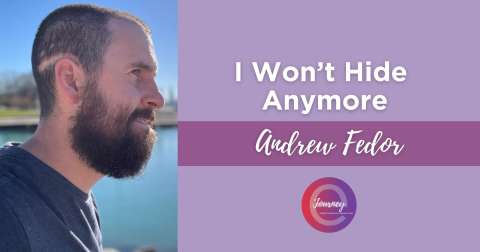I Won't Hide Anymore

By Andrew Fedor , Illinois
Person with EpilepsyTuesday, February 13, 2024
I've experienced the tight grip of epilepsy my entire adult life. In 2013, I needed answers as to why I was experiencing dizzy spells, so I went to about 50 doctor appointments trying to figure it out. I didn't know how else to explain what was happening, and I never considered the idea that they could be seizures because everything I knew about seizures and epilepsy involved flashing lights and convulsions. I didn't lose consciousness or convulse. I would just become dizzy and have verbal issues. I was first diagnosed with vertigo and then migraines. The "dizzy spells" persisted through various types of medication, therapies, and diets. Nothing seemed to help, and they got progressively worse.
I wasn't correctly diagnosed with epilepsy until 2019, when I experienced my first tonic-clonic seizure at work, no less. I woke up from that seizure in an ambulance. I later found out that I was conscious well before that but completely incoherent. I refused to get into the wheelchair when the paramedics arrived, and I kept saying, "I can walk! I'm fine!"
I had no memory or recollection of what occurred, but I knew myself well enough to understand why I would say that. I was afraid of how others would see me, as I always have been. I had hidden my "dizzy spells" from them for more than ten years already. I didn't want to be seen as a liability or, even worse, as incapable. I had high expectations for myself and ambitious career goals. For so long, I pushed myself harder around them, pretending nothing was wrong and that I had something to prove. I would hide in bathroom stalls, conference rooms, and staircases anytime I felt a "dizzy spell" coming on. That finally caught up to me on that day, and I pushed myself too far.
After that seizure in 2019, my journey started over. Looking back, it was a blessing in disguise. The doctor visits, tests, and scans started again, and this time, they quickly discovered what was happening: there was an arterial malformation and cortical dysplasia in my left temporal lobe, which is the area of the brain that controls speech, reading, writing, and memory. Everything started to make sense. I remember crying on my way home from learning those results. Not in sadness or disappointment. I was just happy to have some answers finally. I hoped that the seizures would stop with the right treatment.
Upon returning to work, I spoke to close friends and colleagues about what had happened. They were incredibly supportive. They were kind and accommodating. I was finally able to acknowledge my disability for the first time and know that it was accepted. I learned that pushing myself beyond limits was unnecessary and harmful. I didn't need to prove my capability. My work already spoke for itself.
In subsequent years, I was put on several different medications, which helped, but unfortunately, no combination stopped the frequency of near-daily seizures, only the severity. My daily challenges have become different. Instead of "dizzy spells," my seizures now present themselves as aphasia. It's an odd feeling, like being trapped in your mind. It's also created a new fear and anxiety to make matters worse. The outgoing and inviting version of myself has become more quiet and reserved, afraid of the impression others may have when mispronouncing words, mixing words, or even going blank. It has made me want to hide again, but I am not giving up hope.
Recently, I went in for my third and final week-long stay in the epilepsy monitoring unit (EMU), hoping to become a candidate for epilepsy surgery. Unlike the first two visits, this time, I involved invasive EEGs within the depths of my brain. The procedure was successful, and the epilepsy team got all the needed data. I was happy and eager to learn the results in the upcoming weeks. Unfortunately, that joy was short-lived.
Upon returning home, I fell into a 4-hour-long seizure and was rushed to the emergency room. After extensive testing, the doctors were uncertain as to what was happening. I was incapacitated, and my left temporal lobe was completely swollen. They performed an emergency craniotomy the next day and found what was later determined to be a brain infection. Thanks to the quick action of my soon-to-be wife and family, I survived. The outcome could have been way different, but thanks to open conversation with them about my epilepsy, they knew exactly what to do when I didn't and when I couldn't.
I was kept at the hospital for another week, unable to speak, read, or write. After being in the hospital, I had weeks of intravenous antibiotics at home. I've since been recovering physically, mentally, and cognitively with a positive outlook. Not only will my scar not let me hide anymore, which I am okay with, but I don't want to hide anymore. The experience has given me a different perspective on my epilepsy, and that's why I felt compelled to share my story.
Reviewed By: Sara Wyen
